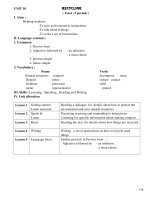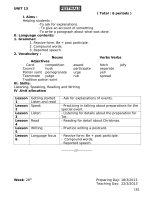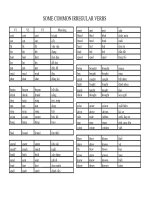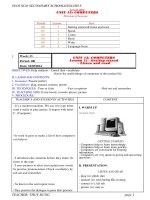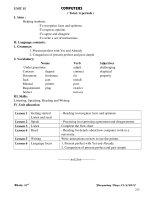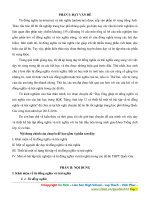unit 15 computers tiếng anh 8 sách cũ nguyễn văn liệt thư viện giáo án điện tử
Bạn đang xem bản rút gọn của tài liệu. Xem và tải ngay bản đầy đủ của tài liệu tại đây (152.01 KB, 6 trang )
<span class='text_page_counter'>(1)</span><div class='page_container' data-page=1>
<b>Period: 103</b>
<b>REVISION, TEST 15’</b>
<b>I. Objectives</b>
<i><b>1. Knowledge, Skills, Attitude: </b></i>
<i><b>a. Knowledge:</b></i>
- By the end of the lesson, Ss review and remember how to the verbs in the correct tense forms.
<i><b>- Vocabulary: </b>(review)</i>
<i><b>- Grammar: </b></i>(review) - The simple present.
- The simple past.
- The simple future.
<i><b>b. Skills:</b></i> listening, speaking, reading and writing
<i><b>c. Attitude:</b></i> Not available.
<i><b>2. Capacity is formed and developed for students</b></i>
- Self-learning capability.
- Communicative competence
- Cooperation capacity
<b>II. Preparation</b>
<i><b>1. Teacher: </b></i>lesson plane, book, color chalks, pictures, MP3
<i><b>2. Students:</b></i> books, notebooks, pen, ruler …
<b>III. Students’ activities</b>
<i><b>1. Warm up</b></i>
<i><b>2. Knowledge formation activities (26’)</b></i>
<b>Teacher’s and Students’ activities</b> <b>Content</b>
- Teacher has students remember the
usage, the adverbs and the formation of
the present simple tense.
- Students remember and state before the
class.
- Teacher checks and corrects.
- Students copy down the usage, the
adverbs and the formation of this tense.
Then give some examples.
- Teacher corrects if necessary.
<b>1. Simple present.</b>
<i>* Ss remember the way to use the simple present.</i>
<i><b>*Usage</b></i>: expressing habitual or everyday activity, used for
general statements of fact,… .
<i><b>*Adverbs:</b></i> sometimes, often, usually, always, never,
every….
<i><b>*Formation :</b></i>
<b>a. To be : is / am / are</b>
-S + is/ am/ are … .
-S + be + not … .
-Be + S … ?
Ex : I am a student.
He isn’t a teacher.
Are you farmers ?
<b>b. Ordinary verbs .</b>
-S + V-s / -es + … .
-S +don’t / doesn’t + V (bare inf.) + … .
-Do / Does + S + V (bare inf.) + … ?
Ex:-Hoa cleans the floor every day.
-Hoa doesn’t clean the floor every day.
-Does Hoa clean the floor every day?
- Teacher has students remember the
usage, the adverbs and the formation of
the past simple tense.
- Students remember and state before the
class.
- Teacher checks and corrects.
- Students copy down the usage, the
adverbs and the formation of this tense.
Then give some examples.
- Teacher corrects if necessary.
<b>2. Past simple tense.</b>
<i>* Ss remember the way to use the simple past.</i>
*<i><b>Usage</b></i> :expressing an action happened and finished at a
particular time in the past.
<i><b>*Adverbs</b></i> : yesterday, last night / week / month / year…,
… ago.
<i><b>*Formation : </b></i>
</div>
<span class='text_page_counter'>(2)</span><div class='page_container' data-page=2>
<b>b. Ordinary verbs .</b>
-S + V-ed/V (past form) … .
-S + didn’t + V (bare inf.) … .
-Did + S + V (bare inf.) …?
<i><b>Ex</b></i>:-Lan bought a new hat yesterday.
-Lan didn’t buy a new hat yesterday.
-Did Lan buy a new hat yesterday?
- Teacher has students remember the
usage, the adverbs and the formation of
the future simple tense.
- Students remember and state before the
class.
- Teacher checks and corrects.
- Students copy down the usage, the
adverbs and the formation of this
tense.Then give some examples.
- Teacher corrects if necessary.
<b>3.Future simple tense.</b>
<i>* Ss remember the way to use the simple future.</i>
<i><b>*Usage</b></i><b>:expressing an action will happen in the future.</b>
<i><b>*Advebs</b></i>: tomorrow, tonight, next week / month / year /
…, on the weekend,… .
<i><b>*Formation</b></i> :
-S + will / shall + V (bare inf.) + … .
-S + won’t / shan’t + V (bare inf.) + … .
-Will / Shall + S + V (bare inf.) + … ?
<i><b>Ex:</b></i>- Minh will come here next summer.
-Minh won’t come here next summer.
-Will Minh come here next summer?
<i><b>3. Test 15’</b></i>
<i><b>I. Match column A with column B that has the same meaning (2</b></i> ms).
<b>Column A</b> <b>Column B</b> <b>Answer</b>
1. buy a. went 1. ...
2. go b. bought 2. ...
3. give c. taught 3. ...
4. teach d. given 4. ...
<i><b>II. Choose the best answer a, b, c or d to comolete the following sentences (3 ms).</b></i>
1. He ... English every day.
a. practic b. to practice c. practiced d. practices
2. Yesterday Lan ... telivision with her family.
a. watch b. to watch c. watched d. watches
3. We ... our school year next month.
a. finish b. will finish c. finished d. finishes
4. She ... to Nha Trang, last week.
a. went b. go c. will go d. goes
5. They have lived in Ca Mau ... .
a. tomorrow b. for 10 years c. last year d. every day
6. She ... a computer since 2002.
a. have bought b. bought c. has bought d. buys
<i><b>III. Fill in the blanks with the correct forms of the verbs: (3 ms).</b></i>
1. Hoa usually ... (help) her mother to cook meal.
2. He ... (work) his homework two hours ago.
3. Next month, we ... (visit) our grandparents.
4. I ... (not go) to work by bus every day.
5. Ba ... (not finish) her homework.
6. She ... (recently gave) a present to her youger brother.
<i><b>IV. Answer the following sentences about you (2 ms).</b></i>
1. Do you go to school every day? -> ...
2. Have you prepared your lesson for three days? -> ...
3. What did you do yesterday? -> ...
4. Where will you go on next weekend? -> ...
<i><b>4. Consolidation (4’)</b></i>
- T reminds Ss the structures above.
<b>IV. Experience:</b>
………
</div>
<span class='text_page_counter'>(3)</span><div class='page_container' data-page=3>
………
<b>Period: 104</b>
<b>REVISION</b>
<b>I. Objectives</b>
<i><b>1. Knowledge, Skills, Attitude: </b></i>
<i><b>a. Knowledge:</b></i>
- By the end of the lesson, Ss review and remember how to the verbs in the correct tense forms.
<i><b>- Vocabulary: </b>(review)</i>
<i><b>- Grammar: </b></i>(review) - The present perfect.
- The present progressive.
- The past progressive.
<i><b>b. Skills:</b></i> listening, speaking, reading and writing
<i><b>c. Attitude:</b></i> Not available.
<i><b>2. Capacity is formed and developed for students</b></i>
- Self-learning capability.
- Communicative competence
- Cooperation capacity
<b>II. Preparation</b>
<i><b>1. Teacher: </b></i>lesson plane, book, color chalks, pictures, MP3
<i><b>2. Students:</b></i> books, notebooks, pen, ruler …
<b>III. Students’ activities</b>
<i><b>1. Warm up 5’</b></i>
<b>Teacher’s and Students’ activities</b> <b>Content</b>
- T asks Ss say the the structure of the
present perfact. Then writes on the board.
- Ss say.
* The present perfact.
- S + have/ has + P.P ...
<i><b>2. Knowledge formation activities (36’)</b></i>
- Teacher has students remember the
usage, the adverbs and the formation of
the present perfect tense.
- Students remember and state before the
class.
- Teacher checks and corrects.
- Students copy down the usage, the
adverbs and the formation of this
tense.Then give some examples.
- Teacher corrects if necessary.
<b>4. Present perfect tense.</b>
<i>* Ss remember the way to use the present perfect .</i>
<i><b>* Usage</b></i>:expressing an action that began in the past and
continues to the present, or at an unspecified time in the
past, or an action has just happened.
<i><b>* Adverbs:</b></i> since, for, already, recently, just, ever, never,
yet, … .
<i><b>* Formation</b></i>:
-S + have / has + V-ed / V (past participle) + ….
-S + haven’t / hasn’t + V-ed / V (p.p) + … .
-Have / Has + S + V-ed / V (p.p) +… ?
<i><b>Ex:</b></i>-I have already seen that film.
-Long hasn’t met Loan since 2005.
-Have you visited HaLong Bay yet?
- Teacher has students remember the
usage, the adverbs and the formation of
the present progressive tense.
- Students remember and state before the
class.
- Teacher checks and corrects.
- Students copy down the usage, the
adverbs and the formation of this
tense.Then give some examples.
- Teacher corrects if necessary.
<b>5. Present progressive.</b>
<i>* Ss remember the way to use the present progessive.</i>
<i><b>* Usage</b></i>:expressing an action that is happening at present.
<i><b>* Adverbs:</b></i> now, at the present, at the moment.
<i><b>* Formation</b></i>:
-S + is/ am/ are + V-ing … .
-S + be + not + V-ing … .
-Be + S + V-ing … ?
Ex: I am having dinner now.
She is not reading a book at the present.
Are you watching TV at the moment ?
* Lưu ý : always dùng với thì HTTD mang nghĩa phàn
nàn.
</div>
<span class='text_page_counter'>(4)</span><div class='page_container' data-page=4>
- Teacher has students remember the
usage, the adverbs and the formation of
the past progressive tense.
- Students remember and state before the
class.
- Teacher checks and corrects.
- Students copy down the usage, the
adverbs and the formation of this
tense.Then give some examples.
- Teacher corrects if necessary.
<b>6. Past progressive.</b>
<i>* Ss remember the way to use the past progressive.</i>
<i><b>* Usage</b></i>:expressing an action that was happening at the
point of time in the past.
<i><b>* Adverbs:</b></i> at five o’clock yesterday, … .<i><b> * Formation</b></i>:
-S + was/were + V-ing … .
-S + wasn’t/weren’t + V-ing … .
-Was/Were + S + V-ing … ?
Ex: I was having dinner at 8 o’clock last night.
She wasn’t reading a book at five yesterday .
Were you watching TV at ten last night ?
<b>* Lưu ý : thì QKTD đi kèm với thì QKĐ để diễn tả một </b>
hành động đang xãy ra thì hành động khác xãy đến trong
quá khứ.
When I came, he was watching TV.
The phone rang while we were having dinner.
<i>When (past simple)</i>
<i>While (past progressive)</i>
<i><b>4. Consolidation (4’)</b></i>
- T reminds Ss the structures above.
<b>IV. Experience:</b>
………
………
………
<b>Period: 105</b>
<b>THE SECOND SEMESTER EXAMINATION</b>
<b>I. Objectives</b>
<i><b>1. Knowledge, Skills, Attitude: </b></i>
<i><b>a. Knowledge:</b></i>
- T checks students’ knowledge from unit 9 to unit 15.
<i><b>- Vocabulary: </b></i>Related to unit 9 to 15.
<i><b>- Grammar: </b></i>Related to unit 9 to 15.
<i><b>b. Skills:</b></i> listening, speaking, reading and writing
<i><b>c. Attitude:</b></i> Not available.
<i><b>2. Capacity is formed and developed for students</b></i>
- Self-learning capability.
<b>II. Preparation</b>
<i><b>1. Teacher: </b></i>lesson plane, book, color chalks, pictures, MP3
<i><b>2. Students:</b></i> books, notebooks, pen, ruler …
<b>III. Students’ activities</b>
<i><b>1. Matrix</b></i>
<b>Tên chủ đề</b>
<b>Nhận biết</b> <b>Thông hiểu</b> <b>Vận dụng</b>
<b>Cộng</b>
TNKQ TL TNKQ TL <sub>TNKQ</sub>Cấp độ thấp<sub>TL</sub> <sub>TNKQ</sub>Cấp độ cao<sub>TL</sub>
<b>A. Language focus</b> <i>6</i>
<i>1,5</i>
<i>6</i>
<i>1,5</i>
<i>12</i>
<i>3,0</i>
<b>B. Writing</b> <i>4</i>
<i>1,0</i>
<i>2</i>
<i>0.5</i>
<i>2</i>
<i>1,0</i>
<i>8</i>
<i>2,5</i>
<b>C. Reading</b> <i>4</i> <i><sub>1,0</sub></i> <i>3<sub>1,5</sub></i> <i>7</i> <i><sub>2,5</sub></i>
<b>D. Listening</b> <i>2</i> <i><sub>0,5</sub></i> <i>2</i> <i><sub>0,5</sub></i> <i>4<sub>1,0</sub></i> <i>8</i> <i><sub>2,0</sub></i>
<b>Total</b> <i>12</i> <i><sub>3,0</sub></i> <i>13</i> <i><sub>4,0</sub></i> <i>8</i> <i><sub>2,0</sub></i> <i>2</i> <i><sub>1,0</sub></i> <i>35</i> <i><sub>10,0</sub></i>
</div>
<span class='text_page_counter'>(5)</span><div class='page_container' data-page=5>
<i><b>I. Choose the letter a, b, c or d to complete every sentence (1.5 ms).</b></i>
1. She hasn’t finished the letter ………..
a. already b. yet c. never d. just
2. Do you mind ………..the window?
a. close b. closes c. closing d. to close
3. Ba ……….. a shower at 8 o’clock last night.
a. is taking b. takes c. taked d. was taking
4. They always visit her grandparents ………..the weekend.
a. on b. in c. after d. between
5. Lan says: “She is a student.” -> Lan said she ……….. a student.
a. is b. was c. are d. were
6. “Does he go to the movie? -> An asked Ba ……….. he went to the movie.
a. where b. what c. whether d. when
II. Matching (1.5 ms).
<b>Verb</b> <b>Past participle form</b> <b>Answers</b>
1. say a. written 1. ...
2. do b. seen 2. ...
3. go c. bought 3. ...
4. buy d. gone 4. ...
5. see e. done 5. ...
6. write f. said 6. ...
<b>B. Writing (2,5 ms).</b>
<i><b>I. Complete the following sentences with the words given (1,0 m).</b></i>
1. Sydney Opera House / complete / in 1973. -> ………
2. The Le family / sleep / when / the mailman / come. -> ………
3. Where / you / go / tomorrow morning? -> ………
4. What / you / do / now / Ba? -> ………
<i><b>II. Use the correct tense with the verbs in brackets (0,5 m).</b></i>
1. A new supermarket ……….. (build) next year.
2. Would you mind if I ……….. (open) the door.
<i><b>III. Complete the second sentence so that it has the same meaning to the first (1,0 m).</b></i>
1. Do you want to visit Ho Chi Minh City? <i>-> She asked me </i>………
2. Could you send the letter for me? <i>-> Would you mind ………</i>
<b>C. Reading comprehension (2.5 ms)</b>
William Shakespeare was the greatest writer in the English literature. He was born in 1564 in
Stratford-upon- Avon. At the age of eighteen he married Anne Hathaway, who was eight years older than himself.
A few years later he moved to London, where he worked as an actor and a playwright. Shakespeare wrote
thirty seven plays and 154 sonnets (a kind of poem containing 14 lines). His most famous plays are
the four great tragedies - Othelo, Macbeth, Hamlet, and King Lear. Shakespeare died in
Stratford on 23 April 1616, but his plays are still very popular today. They have been translated
into different languages, and many of them have been made into films, both in English and
other languages.
<i><b>I. True or false? Check the boxes (1,0 m).</b></i> T F
1. Shakespeare was the greatest writer in the English literature.
2. He married Anne Hathaway at nineteen years old.
3. Shakespeare wrote thirty seven playsand 154 sonnets.
4. Shakespeare died in Stratford on 23 April 1661.
<i><b>II. Answer the questions (1,5 ms).</b></i>
1. Was Shakespeare born in 1564 in Stratford- upon- Avon? -> ………
2. Did Shakespeare write thirty eight plays? -> ………
3. When did he die? -> ………
4. What are still popular today? -> ………
D. Listening (2.0 ms).
</div>
<span class='text_page_counter'>(6)</span><div class='page_container' data-page=6>
2. Mrs. Robinson wants some roses.
3. Liz buys a bottle of milk.
4. Mrs. Robinson is going to go to Nga’s house.
<i><b>II. Complete the sentences with the works you hear (1,0 m).</b></i>
1. Does Mr. Robinson go to the fish market? -> ………
2. Does Mr. Robinson buy some marigolds? -> ………
3. Why Mrs. Robinson want some marigolds? -> ………
4. Where is Mrs. Robinson going to go? -> ………
<i><b>3. Answer keys</b></i>
<b>A. Language focus (3,0 ms).</b>
<i><b>I. Choose the letter a, b, c or d to complete every sentence (1.5 ms).</b></i>
1. b. yet 2. c. closing 3. d. was taking 4. a. on 5. b. was 6. c. whether
<i><b>II. Matching (1.5 ms).</b></i>
1 + f 2 + e 3 + d 4 + c 5 + b 6 + a
<b>B. Writing (2,5 ms).</b>
<i><b>I. Complete the following sentences with the words given (1,0 m).</b></i>
1. -> Sydney Opera House was completed in 1973.
2. -> The Le family was sleeping when the mailman came.
3. -> Where will you go tomorrow morning?
4. -> What are you doing now, Ba?
<i><b>II. Use the correct tense with the verbs in brackets (0,5 m).</b></i>
1. will be built 2. opened
<i><b>III. Complete the second sentence so that it has the same meaning to the first (1,0 m).</b></i>
1. -> She asked me if I wanted to visit Ho Chi Minh City.
2. -> Would you mind if you sent the letter for me?<i>/ Would you mind sending the letter for me?</i>
<b>C. Reading comprehension (2.5 ms)</b>
<i><b>I. True or false? Check the boxes (1,0 m).</b></i>
1. T 2. F 3 T 4. F
<i><b>II. Answer the questions (1,5 ms).</b></i>
1. -> Yes, he was. 2. -> No, he did not.
3. -> He died on 23 April 1616 4. -> His plays are still very popular today.
<b>D. Listening (2.0 ms). </b>
<i><b>I. True or false? Listen and check (v) the boxes (1,0 m).</b></i>
1. T 2. F 3. F 4. T
<i><b>II. Complete the sentences with the works you hear (1,0 m).</b></i>
1. -> No, he does not. 2. -> Yes, he does.
3. -> Because they are traditional at tet. 4. -> Mrs. Robinson going to go to Nga’s house.
<b>IV. Experience:</b>
………
………
………
<b>Signature of the Leader</b>
</div>
<!--links-->



